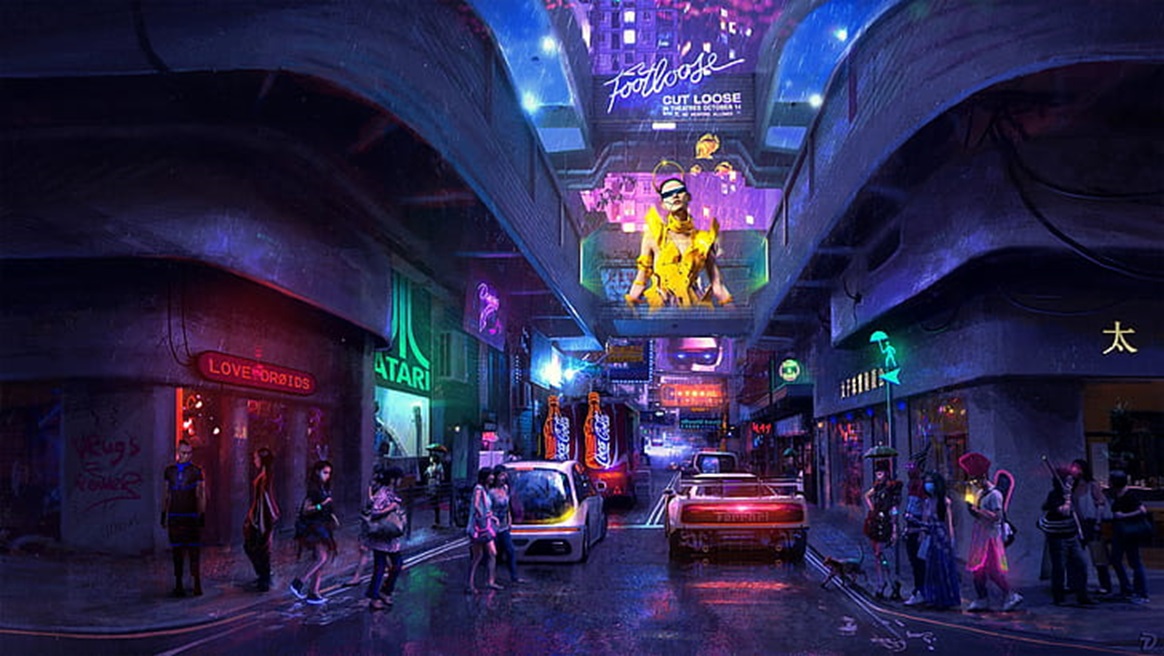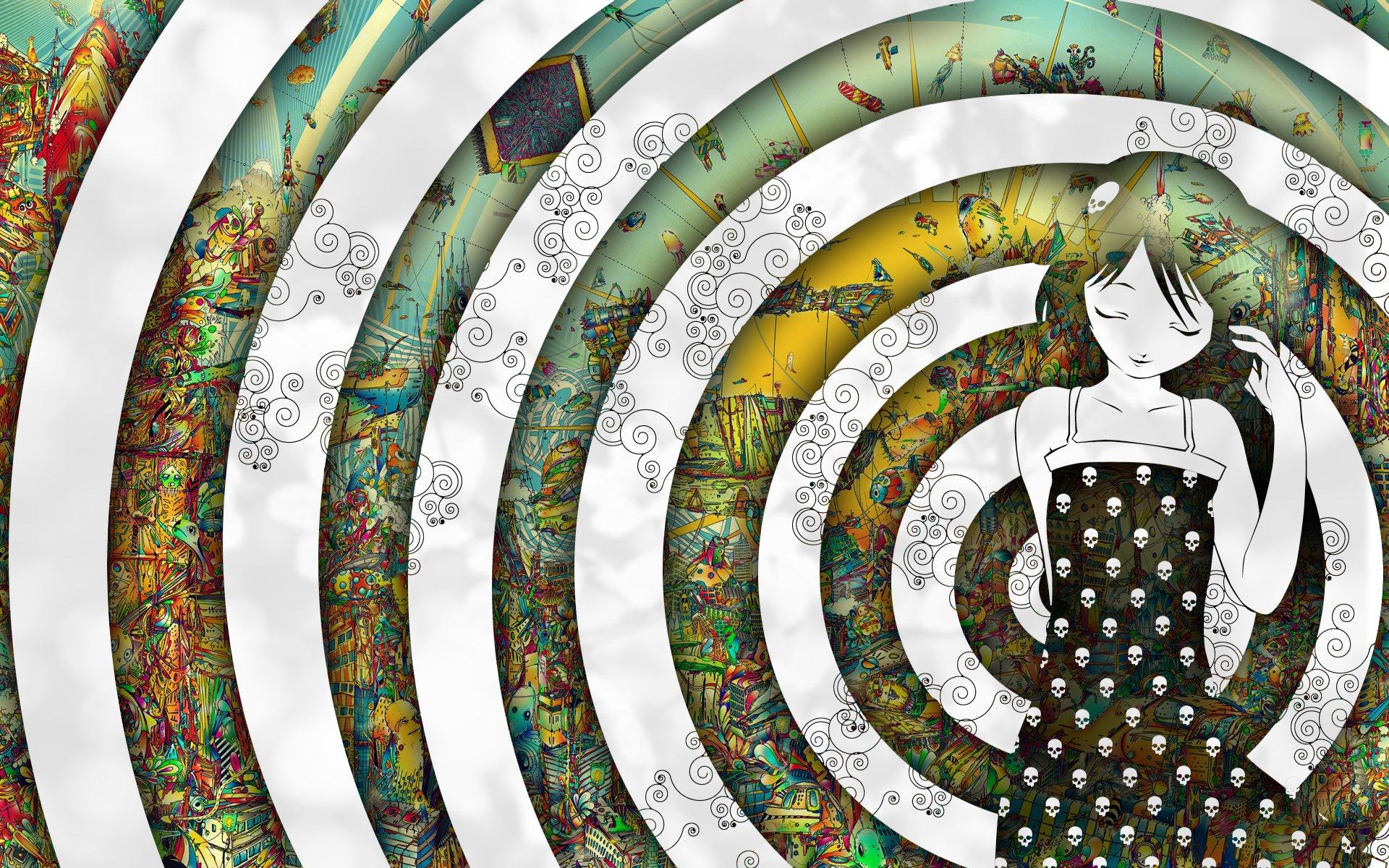Our predicament is that we get lost in our own constructs. We create the construct, then we get well and truly lost in it! The first part of this process sounds positive to us – ‘creating a construct’ sounds like a pretty good thing to do. It tends to sound like an accomplishment, no matter what might follow, no matter what might happen in the second part of the process. When we look into it however we discover that even this (even this glorious ‘first phase’ of the process) isn’t that glorious really. It looks impressive but it isn’t. The reason we say this is that when we create the construct, we think that we know that we’re doing, but actually we don’t. We have the impression that it is a conscious process, but it isn’t. It’s an unconscious one. Generally speaking, when we ‘do’ stuff in a deliberate or ‘purposeful’ way it’s because there are unconscious factors at work in us, predisposing us to do whatever it is that we end up doing. I think that I want to do it (I think that it’s ‘my own idea’) but really it’s the unconscious factors that want me to do it. It’s not my idea at all…
So straightaway things don’t look so good – I’m not really creating the construct, a bunch of unconscious motivating factors are compelling me to create it, without me knowing what is really going on. When we investigate the matter further, we see that the ‘unconscious motivating factors’ are actually the very same thing as the construct that they are compelling me to create. So really the construct is creating itself via me! Put this way, things don’t sound so good at all! I’m just a tool, and what’s worse, I’m a tool who doesn’t know himself to be a tool.
This is similar to David Bohm’s point when he says that the system of thought consists equally of the patterns of logic that exist in our minds, and the structures that we create on the basis of this logic in the outside world. It’s all ‘a logical continuity’, its all the one structure. As David Bohm (1890, p 58) argues in Wholeness and the Implicate Order, it’s all the one self-perpetuating loop:
…all man-made features of our general environment are, in this sense, extensions of the process of thought, for their shapes, forms and general orders of movement originate basically in thought, and are incorporated within this environment, in the activity of human work, which is guided by such thought. Vice versa, everything in the general environment has, either naturally or through human activity, a shape, a form, and mode of movement, the content of which ‘flows in’ through perception, giving rise to sense impressions which leave memory traces, and thus contribute to the basis of further thought.
It might be said therefore that the system of thought creates itself (or rather, it perpetuates or replicates itself) through us, through human activity. The system of thought, we might say, is essentially a situation that is characterized by its profound lack of freedom – it only has the freedom to do one thing and that is to repeat itself over and over again. That’s what makes it the system of thought! The freedom to endlessly reiterate the existing pattern is the same thing as having precisely zero freedom – this is what we might call the mechanical situation, the ‘zero freedom’ situation… This idea echoes what David Bohm and Mark Edwards (1991, p 15) say here in Changing Consciousness.
[Thought] seems to have some inertia, a tendency to continue. It seems to have a necessity that we keep on doing it. However … we often find that we cannot easily give up the tendency to hold rigidly to patterns of thought built up over a long time. We are then caught up in what may be called absolute necessity. This kind of thought leaves no room at all intellectually for any other possibility, while emotionally and physically, it means we take a stance in our feelings, in our bodies, and indeed, in our whole culture, of holding back or resisting. This stance implies that under no circumstances whatsoever can we allow ourselves to give up certain things or change them.
This is – very obviously – not a great situation at all from our point of view (since we are not in our essence mechanical, as the system of thought is) but what we do when we are stuck in it (stuck in it so thoroughly that we don’t even know that we’re stuck in anything) is to ‘turn a vice into a virtue’ such that the zero freedom of having to repeat the pattern actually becomes, for us, a positive expression or manifestation of our will. This way there is no conflict, and the only problem facing us is the problem of how exactly we are to go about enacting the pattern, and what might be getting in our way as we try to do this!
This is a remarkably effective trick because once we go along with it then the whole world is turned on its head – the abysmal absence of freedom suddenly gets transformed into ‘the freedom for me to realize my goal’, or ‘the freedom for me to enact my agenda’, which is clearly putting a very different spin on things. One hundred and eighty degrees of difference, in fact. Once we have adapted ourselves to the system of thought in this way the only type of freedom we understand, therefore, is the freedom to do what the system of thought wants us to do…
One thing we can say about this remarkable state of affairs is therefore that it offers us an extraordinarily efficacious way of ‘getting lost’! From the outside, the constructs or structures generated by the system of thought are one thing (i.e. they are constructs or structures) but from the inside they are quite another. From the outside we can plainly see that these structures contain no freedom whatsoever – they contain only the freedom to do what the structure ‘wants us to do’, just like a tram-line or train-track only contains the freedom for us to go along in the direction it itself is going – but from the inside not only does it seem that there is lots of freedom available to us, it also seems to us as if what we are doing (or trying to do) is what we really want to do. As we have said, the only time we experience ‘lack of freedom’ is when something happens to stop us going down the tram-line or train-track. This is what causes us to get upset – not being able to do what the external authority of the system of thought wants us to do. The fact that we are being controlled by an external deterministic authority doesn’t bother us at all…
The world that we live in is made up of innumerable constructs, innumerable structures, innumerable systems, all nested one within the other like a series of Russian dolls (or we could say, like the different ‘levels’ of a highly-sophisticated RPG console game). The only type of freedom we know is the freedom to ‘progress within the terms of the game’, i.e. the freedom to struggle to obtain a more advantageous situation for ourselves within the terms of how that game defines ‘advantageous’. The intricacies and convolutions of the game are endless and so the chances of us gaining insight into fact that it is all just an elaborate trap (a kind of ‘hall of mirrors’) is exceedingly remote, to say the least. The more caught up, the more involved we are, the more of ourselves we lose in the process, and the more of ourselves we lose the less able we are to see that the whole business is pure nonsense from beginning to end.
The reason we can say that this business of playing the game (or adapting to the construct) is ‘pure nonsense’ is because none of it has anything to do with who we are outside of the game (or outside of the construct). It’s only meaningful from the point of view of the game, from the point of view of the construct, and this game or construct has absolutely nothing to do with who we essentially are! It is something ‘outside of ourselves’, something which only seems meaningful when we forget who we are outside of the game, and mistake ourselves for who we ‘supposedly are’ within the game. The more we lose ourselves in ‘being who we aren’t’, therefore, the more real the game becomes.
When we’ve lost ourselves in the construct, then we do not see it for nonsense. The thought cannot see itself. When we’re lost in the construct we do not see garbage for garbage – on the contrary, it glitters like the purest gold, it glimmers and glistens like treasure. We are trapped by our own inner ‘deficit’ – the inner absence which is caused by our identification with ‘who we’re not’ (with ‘who the construct says we are’) becomes a mechanical force that determines us completely from the outside. As Jung indicates in Alchemical Studies, the light of nature (the lumen naturae) is lost to us, it is (apparently) eradicated without a trace and in its place there appears the deceptive ‘light of reason’ (the ignis fatuus). A statement like this doesn’t tend to make sense to us since we worship the light of reason, the light of the rational intellect. What the rational intellect says goes, and what it doesn’t say, doesn’t go! We are incapable of questioning it – the light of reason (which is the ignis fatuus, the ‘foolish fire’, ‘will-o’-the-wisp,’ or ‘light that deceives’) is our trusted yardstick, and as such it determines everything that we are able to see as ‘true’…
When we allow the rational mind to write the script then reality is turned into the ‘photographic negative’ of itself. Absence is transformed into presence, the lack of freedom into apparent freedom, redundancy (i.e. ‘blankness’) into what passes for genuine, honest-to-goodness information. The gloriously ‘wide-open’ sweep of reality is diminished so much that it becomes too insignificant, too irrelevant, for us to even notice, whilst the over-blown representations generated by the system of thought (vacuous though they are) automatically become matters of the very greatest importance, and exercise an unchallengeable authority (or we could say, ‘a stupefying fascination’) over our enfeebled attention.
This is really a spectacularly astonishing kind of a thing – these mental constructs of ours are entirely vacant, they are as vacant as vacant can be, whilst all around them (on all sides, as it were) lie riches and wonders beyond description. And yet our attention is glued to what lies within the construct (i.e. glued to what the system of thought says is true) as if the answer to everything lay there. The irony of this situation cannot be over-stated – supposedly, what we are latching our attention onto is ‘the wonder of wonders’, ‘the glory of glories’. What we are latches our attention onto is supposedly reality itself. And yet what we are dutifully fixating our attention onto is the absence of reality, the absence of all that is wondrous and glorious! The wonder of wonders, the glory of glories, is all around us – there is nowhere where it is not, and yet we have perfected a trick whereby we manage to completely ignore it, remain completely oblivious to it, and devote ourselves instead to some petty artificial ‘reality’ which we ourselves – out of the poverty of our rational intellect – have created. The stupendous, incomprehensible profundity of the ‘natural world’ lies all around us, but rather than take even the slightest bit of interest in it we obsess over our empty games…
This is the irony of ironies, the joke of jokes. If we could understand the joke, if we could see the irony, then we would straightaway be released from the sterile prison of the rational mind, but the point is of course that we don’t get the joke, that we don’t see the irony, and because of this we take the nonsense that we are caught up in as seriously as we could ever take anything. We sweat blood over this nonsense – we put ourselves through the wringer on a daily basis on account of this nonsense. We are imprisoned by ‘like and dislike’ – we are held hostage by our mechanical attachments. We’re taking what we attracted to very seriously (by virtue of the fact that we are attracted) and we are taking what we are averse to very seriously as well (by virtue of the fact that we are so averse to it). So when it is said that we are ‘attached’ to our mechanical patterns of being in the world this simply means that we are held prisoner by fear and greed – we are fearful of what our thinking tells us we should be fearful of, and we are desirous of what this thinking tells us we should be desirous of, and just as long as we remain in the grip of attraction versus aversion in this way there is no space for insight, no space for humour, no space for ‘getting the joke’…
When we have no insight, when we don’t get the joke, when we can’t see the cosmic irony, then the humour of our situation is transformed into deadly seriousness – the seriousness which is the stock-in-trade of the system of thought. All mental constructs, all logical systems, are the same really – they function by creating a situation where there is ‘where we want to be’ at one end, and ‘where we don’t want to be’ at the other. This is the game – this is every game there ever was, in fact. There is the possibility of winning on the one hand, and the possibility of losing on the other. One possibility excites us immeasurably; the other dismays us beyond measure. But the joke is that ‘where we want to be’ (the positive or ‘winning’ outcome) is exactly the same as ‘where we don’t want to be’ (the negative or ‘losing’ outcome) – its all the same construct, it’s all the same virtual-reality game. Winning equals ‘the game’ and losing equals ‘the game,’ and the game is at all times perfectly sterile because it never takes us anywhere apart from itself (and ‘itself’, as we have said, has nothing to do with who we really are).
All of our games, all of our constructs, are examples of duality (plus and minus, right and wrong, good and bad) and the illusion that we are suffering from is the illusion that there is some kind of separation between these poles. If there is space between ‘right’ and ‘wrong’ then we can get from one to the other and it is this perception that makes the game (subjectively) worth playing. It is this virtual separation that makes our constructs meaningful. All of the purposeful activity that we engage in takes place within the ‘stretch’ that we believe to exist between the one pole and the other – this is where our ‘rationally-mediated lives’ take place, not between ‘the cradle and the grave’ as we might suppose.
The genuine space that exists between our birth and death is lost to us because we are too taken up ‘mining for gold’ (or ‘looking for treasures’) in the imaginary stretch between one opposite and the other, one rational concept and another. We’re not free to explore the wonderful uncharted reality of our lives because we’re ‘lost in the construct’…
Image – wallpaperflare.com






